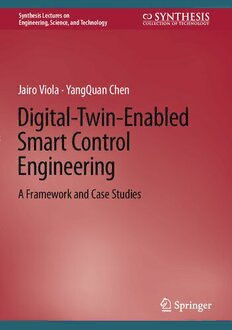
Digital-Twin-Enabled Smart Control Engineering: A Framework and Case Studies PDF
120 Pages·2023·5.18 MB·English
Most books are stored in the elastic cloud where traffic is expensive. For this reason, we have a limit on daily download.
Preview Digital-Twin-Enabled Smart Control Engineering: A Framework and Case Studies
Description:
This book presents a novel design framework for the development of Digital Twin (DT) models for process- and motion-control applications. It is based on system-data acquisition using cutting-edge computing technologies, modelling of physical-system behavior through detailed simultaneous simulation of different aspects of the system, and optimal dynamic behavior-matching of the process. The design framework is enhanced with real-time data analytics to improve the performance of the DT’s behavior-matching with the real system or physical twin.The methods of creating a DT detailed in Digital-Twin-Enabled Smart Control Engineering make possible the study of a system for real-time controller tuning and fault detection. They also facilitate life-cycle analysis for multiple critical and dangerous conditions that cannot be explored in the corresponding real system or physical twin. The authors show how a DT can be exploited to enable self-optimizing capabilities in feedback control systems.The DT framework and the control-performance assessment, fault diagnosis and prognosis, remaining-useful-life analysis, and self-optimizing control abilities it allows are validated with both process- and motion-control systems and their DTs. Supporting MATLAB-based material for a case study and an expanded introduction to the basic elements of DTs can be accessed on an associated website.This book helps university researchers from many areas of engineering to develop new tools for control design and reliability and life-cycle assessment and helps practicing engineers working with robotic, manufacturing and processing, and mechatronic systems to maintain and develop the mechanical tools they use.
See more
The list of books you might like
Most books are stored in the elastic cloud where traffic is expensive. For this reason, we have a limit on daily download.
